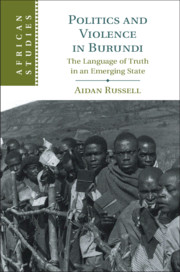Book contents
- Politics and Violence in Burundi
- African Studies Series
- Politics and Violence in Burundi
- Copyright page
- Contents
- Figures and Maps
- Acknowledgements
- Linguistic and Orthographic Note
- Glossary of Terms
- List of Abbreviations
- Introduction
- Prologue, 1796–1959
- Part I 1959–1961: ‘To See the Son of a King’
- 1 Ukuri ni kumwe
- 2 Ibigendajoro
- Part II 1961–1967: ‘A Most Total Anarchy’
- Part III 1968–1972: ‘Please Send Me a Car to Take Them Away’
- Conclusion
- Bibliography
- Index
- African Studies Series
1 - Ukuri ni kumwe
Talking Truth
from Part I - 1959–1961: ‘To See the Son of a King’
Published online by Cambridge University Press: 03 October 2019
- Politics and Violence in Burundi
- African Studies Series
- Politics and Violence in Burundi
- Copyright page
- Contents
- Figures and Maps
- Acknowledgements
- Linguistic and Orthographic Note
- Glossary of Terms
- List of Abbreviations
- Introduction
- Prologue, 1796–1959
- Part I 1959–1961: ‘To See the Son of a King’
- 1 Ukuri ni kumwe
- 2 Ibigendajoro
- Part II 1961–1967: ‘A Most Total Anarchy’
- Part III 1968–1972: ‘Please Send Me a Car to Take Them Away’
- Conclusion
- Bibliography
- Index
- African Studies Series
Summary
This chapter presents the political parties and personalities that dominated Burundi’s first democratic contest, between 1959 and 1961, and examines the modes of political communication they deployed. Between the appeals of nationalist, gradualist and populist parties, most popular debate took place in the form of rumour: the population passed on uncertain news, contradictory political claims and speculation about political figures, and discussed which rumours were true. While the authority of the king was a point of consensus, the relative authority of chiefs and politicians was uncertain. The chapter examines the modes of authority adopted in public address by Chief Baranyanka, the nationalist Uprona party and Belgian authorities, and focuses on the rhetoric of written tracts perfected by Uprona. It identifies a shared language of truth across all political voices, denouncing rumour and seeking to convince the population of a singular truth of authority, and demonstrates the importance of Uprona’s attempts to engage the intelligence of its audience. In recognising the truth the party expressed through this language of truth, the population endorsed its authority.
- Type
- Chapter
- Information
- Politics and Violence in BurundiThe Language of Truth in an Emerging State, pp. 65 - 94Publisher: Cambridge University PressPrint publication year: 2019

